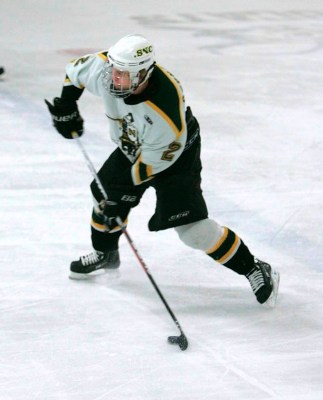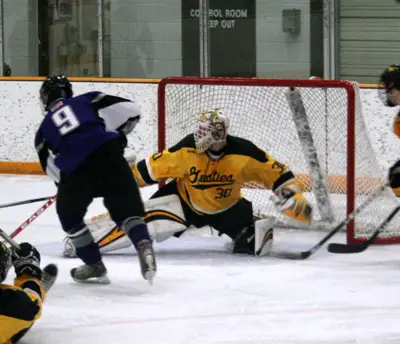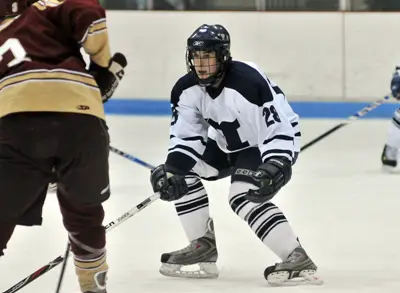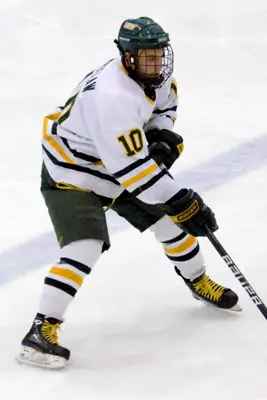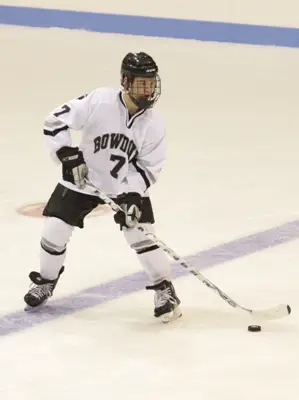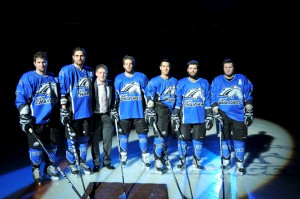Two upsets in the first round; will we see another before Albany? Furthermore, would any outcome of St. Lawrence-Colgate actually qualify as an upset? All that and more, here and now.
No. 11 Brown @ No. 1 Yale
There’s no two ways about it: Brown has a massive challenge ahead of it in Yale.
“We’re major underdogs. You’re talking about a Yale team that won the league’s regular season, spanked us twice … we gave up 14 goals against [to them],” Brown coach Brendan Whittet said. “We are major, major underdogs, but we relish the opportunity. We’re happy to still be playing.”
The Bears are coming off one big upset already, as Bruno knocked off sixth-seeded Rensselaer in three games. Brown advanced by jumping out to a 3-0 lead early in the third period of Game 3, then holding on for the 3-2 win.
“I thought we played really, really intelligent hockey,” said Whittet. “We didn’t beat ourselves. We were on the defensive side of pucks a lot of times, and of the opposition, and I thought we controlled the gritty areas. We were good along the wall, I thought we were good in front of the net. In both wins, I thought we were good in both defensive and offensive situations.”
One issue working against Yale will be the loss of superstar forward Sean Backman, who injured his foot two weeks back in an undisclosed fashion. Whittet, though, doesn’t think that will matter much in this series.
“I think it’s unfortunate,” he said. “Sean’s an unbelievable hockey player — I think he is a premier player in the NCAA loop, and I just think it’s a bad break for him and for Yale. But that doesn’t change anything. They are the No. 1 scoring team in the country for a reason, and Sean’s a part of it, but you talk about a lot of depth on that team with [Broc] Little, and Denny Kearney, and [Brian] O’Neill and [Andrew] Miller; you can just go down the list. They are deep and they are very, very talented offensively. It doesn’t change the way we prepare at all.”
Brown’s strategy for the series? Slow it down, and don’t give it up.
“We’ve just got to be intelligent in what we do; we don’t want to be in the box,” said Whittet. “I don’t want them on the power play — they have a pretty hefty power-play percentage. So I know I don’t want to put them on the power play unduly, and we have to make sure we’re very accountable in our systems. We’ll have to come back hard; we can’t give them odd-man rushes. We have to win the battles in the corners. Again, you’re talking about a team that put up 55 shots against us in regulation at their rink about a month and a half ago. We’re going to have to be really, really good on the defensive side. Michael Clemente’s going to have to be excellent.
“They’re a hell of a good team. They’re the best team in our league, and I think they are legit, legit national championship — and not just Final Four — but national championship-caliber type of team. They’re very very impressive, they’ve done a great job there. They’re coached extremely well and they’re a tough, tough team. For us, we’re going to go in and leave it on the ice, and do the best we can.”
Critical Factors
• Last week, I pondered whether Brown could overcome its soft third-period tendencies to beat Rensselaer. Turns out, the teams each scored four in the final frame over the three games. This week, Brown has to win the third; no exceptions. Yale had a plus-15 goal differential in the third this year, best in the league.
• The Bulldogs can’t afford to slow down when Brown starts hitting. Yale wins with speed — lethal speed. When the ‘Dogs get sucked into peripheral, physical games, they lose that edge … and it’s by far the biggest edge they’ve got.
• Goaltending, goaltending, goaltending: Clemente has established himself as a serial win-thief in his two years at Brown, while Yale — for all its dominance between the goal lines — has yet to find a true replacement for last year’s goalie, Alec Richards. Yale might — might — sneak by Brown with average netminding, but the season will end abruptly if the Bulldogs can’t find some solid ‘keeping down the stretch.
No. 9 Harvard @ No. 2 Cornell
Last week, it was St. Lawrence hosting Clarkson.
This week’s rivalry series? Harvard at Cornell.
The Ivy arch-rivals weren’t exactly neck-and-neck this season, as Harvard struggled for consistency all year long. Things never truly lined up for the Crimson this season, as one facet or another always seemed to come up short … 60-minute games were few and far between.
With that in mind, Harvard didn’t get to the quarterfinals by accident. The Crimson scored all seven of its goals in the first-round sweep at Princeton in the third period, coming back from a 2-0 deficit in Game 1 to win 4-2, and putting the Tigers down for good with a 3-0 triumph in Game 2.
Goaltender Kyle Richter stopped 70 of 72 shots, Princeton was held scoreless in nine power-play opportunities, and Dannies — Biega and Moriarty — scored in each game of the upset.
Now, though, it’s all about the Big Red.
“We knew going into the playoffs that this is the most balanced the league has been since I’ve been a head coach in the ECAC,” said Cornell head coach Mike Schafer. “We knew that it didn’t matter what opponent we were going to have to face in this round, it was going to be a quality one, which it is.”
“It’s a tough place to play, against a very good team that’s committed to playing a certain way and has success playing that way,” explained Harvard head coach Ted Donato. “We want to play to our strengths as well: we want to get the game to be a fast one, we need to be able to handle their physicality and be able to match their intensity and emotion at home, and do it all with great discipline.”
Speaking of discipline, Donato is fully aware of Cornell’s lethal combination of physicality and power-play success.
“The best penalty-kill is to avoid taking penalties. That’s going to be difficult, but we’re going to have to stay out of the box. Penalty kill-wise, they do a great job of blocking shots, so we’re going to have to have a lot of puck movement and get pucks through to the net. Obviously, their goaltending – (Ben) Scrivens – has been solid all year, so we’re going to have to find a way to make it hard on him: get people and pucks to the net, get a lot of traffic, and get some action in that dirty scoring area to get some success.
“I think we have to stay out of the box,” Donato reiterated. “That’s important. We have to be able to play a complete game, and we have to match some of the things that they do well, and also, we really have to be relentless. They’re big, strong on the puck, physical at both ends of the rink, and we have to really battle – match their physicality with intensity – and I think we really have to play the game at the pace that we want to play at.”
Schafer has his boys focusing on sticking with their game, and making life difficult on the puck-hungry Harvard forwards.
“Harvard’s got experience on defense with (Jack) Christian, (Alex) Biega and (Chad) Morin, and obviously their goaltender played well last weekend, they have talented forwards. We’re going to have to stay above their forwards and play our kind of hockey. We want to be physical, but at the same time, we want to play a game of puck possession: those things have led us to success. We’re healthy and ready to go,” said the veteran coach.
Harvard is playing with the proverbial tabula rasa, and its coach is pleased by his team’s attitude this week.
“I think we’re excited, and I think we’re understanding of the opportunity we have. This is looked at as a new season, a fresh start, and I think we’re excited about that. We played well at Princeton, and this is now an even greater challenge to go at Cornell.”
Cornell swept Harvard this year for the first time in six seasons. Payback is not, however, what the Crimson are after.
“I don’t think revenge (is a factor), but any time that we’ve had success in the ECAC tournament – and we’ve gone to the finals three of the last five years – we’ve played Cornell along the way. Twice in the finals, and once in the semifinals, so this is almost a rite of passage to advance in the ECAC: we have to play the Big Red,” noted Donato. “We haven’t played them in a playoff series, we certainly haven’t played at Lynah (in the playoffs), but I think it’s a great opportunity for us and our guys are excited about going up there as the underdog.”
The Red aren’t looking through the Crimson and on to Albany; they know that this series will be anything but a cake walk.
“Our guys are looking forward to it; it should be a lot of fun. With this rivalry, our guys have always known that you can throw records out the window, so it’s perfect for the playoffs: right now we’re 0-0, and they’re 2-0.”
Critical Factors
• Cornell was the only team to allow fewer than 20 goals in any period of league play. The Big Red also built steam as games progressed, scoring 21 first-period goals, then 24 in the second, and 29 in the third … the latter tying the Red with Yale for best goal-differential — plus-15 — in any period. Harvard, on the other hand, got weaker and weaker with each defensive period. Like a controlled demolition by implosion, Harvard will have to defuse Cornell’s systems before they suck the breath right out of the Crimson.
• Special teams are obviously going to be a factor as well. Harvard’s units rank just above the middle of the pack, but Cornell is lights-out: 87.3 percent on the kill, and a 23.7 percent power play. Suffice to say, the Crimson has its work cut out.
No. 7 Quinnipiac @ No. 3 Union
Here they are again, the Union Dutchmen in the ECAC Hockey quarterfinals for the third year running.
Nobody would’ve believed it possible just a few years ago, when Union had still yet to win a playoff series despite 16 years in the league. We just didn’t know what lay in store in Schenectady.
This series pits two high-end offensive teams against each other, with the season absolutely on the line for each squad. The Dutchmen are on the outside of the PairWise right now, and know that they won’t come close to qualifying for an at-large bid without making some noise in Albany. Quinnipiac played itself right out of at-large consideration earlier this year, letting a 12-1-0 start fall by the wayside in a disastrous start to 2010.
For the Bobcats, getting to the second round put them back on a winning track. Defeating Dartmouth in three, QU got great goaltending from Dan Clarke and timely scoring from one of the fiercer attacks in the league.
“I thought Dartmouth played very well,” Bobcats coach Rand Pecknold said. “[Scott] Fleming and [Adam] Estoclet were excellent. I thought Dartmouth as a team played very well. We really had a tough time shutting down Fleming. I felt we were fortunate to win the series and move on.”
One of the first factors to jump off the page at you is the inexperience of each side’s goaltending, but neither coach is harboring any doubts at this point in the season.
“[Clarke] played very well on the weekend,” Pecknold said of his sophomore ‘keeper. “Friday and Sunday he was excellent. On Sunday, our whole season was on the line, and he had one of his best games of the year, so I don’t think pressure’s an issue. He’s played in a ton of games this year … and I think he’s beyond the point of being nervous in a playoff game.”
As for Union, rookie Keith Kinkade took over for Corey Milan midway through the campaign, and has shown a steady hand through some trying times.
“He’s got the resume. I don’t know if there’s too many goaltenders coming into college hockey that have built up the resume that Keith did,” said coach Nate Leaman. “Keith won every award he could possibly win last year in junior hockey, as well as leading his team to a championship. He was named MVP of the junior league, named MVP of the championship, so he’s got enough experience there. I’m not worried about that at all.
“The other aspect of it is that we have Corey Milan here as well, and he’s won a playoff series. Both goaltenders have played against Quinnipiac, both goaltenders have had success against Quinnipiac, so I think we’re in OK position there.”
Another keystone in this series will be how often Quinnipiac’s big-time power play can get on the ice against the squeaky-clean Dutchmen.
“I think their power play [is critical],” said Leaman. “They’re a team that has scored a third of its goals this year on the power play. If you look at the plus/minuses of all of their forwards, they only have one forward that’s plus, and I think that’s because they’re so good on the power play, that’s where they get a lot of their goals. I definitely think the power play/penalty kill matchup is going to be really good. Both teams have young D-corps, both teams have really good forwards, and it probably comes down to the goaltending matchup as well.
“I think what was happening at the beginning of the year is, we were taking a lot of penalties and defensively, we were struggling in games,” elaborated Union’s coach. “We finished second-to-last (meaning second-fewest penalty minutes per game) last year with Princeton being last, and then obviously this year — especially if you’re going to play a team like Quinnipiac — the more chances you give them on the power play, the more chances you’re giving this team to have success against you.”
“It’s definitely an issue,” agreed Pecknold. “We played Union three weeks ago, and they just manhandled us [7-3 final]. They dominated the whole game. We were, basically, overmatched. We only got one power play that night. If you want to get your power play on the ice, you’ve got to play hard, and you need to create offensive opportunities — that’s usually when the penalties are going to be called, and we did not do that at all last time against Union.”
Finally, these teams may as well dig in and play trench warfare in the first period: Union doesn’t score much in the opening frame, and Quinnipiac doesn’t allow much.
“Different teams take on different personalities sometimes,” said Leaman. “I think we’re a team that, with our maturity, we get stronger as the game goes on and I don’t think we get rattled very easily, either. We’ve had games where we’ve jumped out, we’ve had games where we’re down, but it’s a situation where [in both cases] we’ve been successful. It’s not something I’m looking at a lot; I just like to see my team get stronger as the game goes on.”
Pecknold picked out a few of his biggest concerns heading into the weekend.
“Union’s obviously having a great year; they’re a top-20 hockey team. I think for us, the key is going to be to shut down that big line: [Mario] Valery-Trabucco, [Adam] Presizniuk and [Jason] Walters,” he said. “The thing that makes Union really good is they’ve got secondary scoring. Their second and third lines are very productive, and the last time we played them, their fourth line — I think — had three goals. We’re going to have to play defense, it’s a very good offensive team, and try to keep the score down.”
While Pecknold is concerned with slowing down the Dutchmen, Leaman is focusing more on controlling his team’s emotions.
“We pride ourselves on being a tough team to play against, and part of that is staying out of the penalty box and being real disciplined. At the same time, being physical, but understanding the fine line between controlling our emotions and playing physical. The last time we played Quinnipiac we only gave them one power play, which was obviously a big key to our success in the game.”
Critical Factors
• Quinnipiac has the best power play in the league, at 25.2 percent. Union, however, has a strong penalty kill (83.1) and has taken the fewest penalties in the conference. The Dutchmen have played five teams with power-play success rates at 20 percent or better: Maine, Cornell, Quinnipiac, Dartmouth and Yale. Union may have allowed 10 goals in 44 shorthanded situations against those foes, but that’s still only four opposing power plays a game. It doesn’t matter how good your PK is if you take too many penalties … nor how bad, if you stay out of the box. This will be the crucial game within the games.
• Last week, QU stifled Dartmouth — one of the league’s fastest-starting teams — in allowing the Big Green only one first-period goal. It came in Dartmouth’s Game 2, 6-3 win … think it’s a coincidence? The Bobcats have been Kevlar-tough in the opening period all year long. Union is relatively slow to light the lamp, scoring an eighth-ranked 17 first-frame goals in conference play before blitzing opponents with 32 in the next period and 31 in the third. The Q’Cats are 12-5-1 this year when scoring first, Union is 13-3-1. Draw your own conclusions.
No. 5 St. Lawrence @ No. 4 Colgate
The most fascinating series of the weekend may go down at Starr Rink in unassuming Hamilton, N.Y.
The quietly successful Colgate Raiders — 13-13-6 going into the final weekend of the regular season, yet ultimately winners of a first-round bye — host the recuperating St. Lawrence Saints, who have now won three of four following a seven-game winless skid (0-4-3).
“I thought we played really well against Clarkson, but we had to, because they played great,” said Saints coach Joe Marsh. “I can tell you, that series was un-believable. You knew they were going to come in and play that way. They were the team that you’d say, ‘Oh boy, you know they’re dangerous.’ They had some boys back healthy, and they were really going to benefit from that clean-slate mentality.”
The Saints are well aware of what they’re up against: Sophomore Austin Smith sets the pace with 40 points, junior Brian Day scored 20 goals this year, and former Hobey Baker candidate David McIntyre is between them with 37 points.
“It’s a tough rink for us,” Marsh said. “We squeaked one out there this year, but they’re a good team. They’re a certain type of team: They always have some guys who can really bring it. They do a great job [getting] the high-end guys — McIntyre, [Tyler] Burton a couple of years ago, [Andy] McDonald before that — they’ve always had some real potent players. I think they’re a team that’s earned their slot, they’re a very dangerous team, and what we’ve got to do is hopefully use some of that intensity from surviving that series … and that’s the best way I can put it, was surviving the Clarkson series … and a series like that, it’s probably worth three weeks of practice.”
Unlike some of the other teams still skating at this time of year, St. Lawrence doesn’t intend to win by filling the net.
“We’re not a team that’s necessarily going to light it up. It’s important first to gain zone time, for us to work real hard, things we’ve been stressing all year long — now they’re sort of magnified a bit,” said Marsh. “It’s not that anything’s changed, it’s just the sense of urgency, is the best way to put it.
“This is going to be a real tough series for us. We know it, we’ve been there enough; it’s like the movie Groundhog Day: It’s springtime, and here we are, we’re back at Colgate. Don’s done a great job, they’ve certainly earned their slot there, and it was a battle for that [bye] slot.”
One item of interest will be the player between the visiting pipes. Alex Petizian started the first two games of the Clarkson series, but surrendered four goals on 28 shots in the Game 2 loss. In came Kain Tisi for the rubber match, and he stopped 23 of 25 in the victory.
“It’s really hard to say [who we’ll start]; we’re splitting hairs with both of them,” mused Marsh. “We went to Petey to start the series, he played well. It wasn’t anything negative toward Petizian [when Tisi started Game 3]; he played two games. So we thought, maybe if we had an advantage, it would be with being able to go with a fresh guy in there. He hasn’t been sitting on the shelf forever, he was ready to go, so I think that helped a little bit. Tisi played well, and it’s kind of a tough deal right now. They’re both doing a good job, and we’d feel comfortable going with either one of them.”
Critical Factors
• St. Lawrence scored two first-period goals against Clarkson last week, but also allowed two. A 9-0-2 team when leading after a period, the first goal is huge for the Saints — who only mustered 14 first-frame goals in league play this season.
• Colgate’s defense got more and more porous as games wore on this year, but the offense picked up the slack with 35 third-period goals against conference opponents, tied for the most goals in any period of play in ECAC Hockey (Yale also scored 35 in the third). SLU, on the other hand, was consistent across all periods, and was strongest offensively in the second stanza. The score after two periods, while always important, likely will carry extra weight in this series.
• The Raiders and Saints were each bottom-four squads on the special teams, and the ‘Gate penalty kill was an especially putrid 75 percent unit this year. Fortunately, the Raiders took only about six minors per game, and that kind of discipline will come in handy against a St. Lawrence power play that has scored in each of its last four games.
Readers’ Poll
Round 2: pick the winners. Like last week, I’ve enabled multiple votes so you can pick your ECAC Hockey Final Four … just don’t vote for both teams in any given matchup, or your tallies are invalidated.
Last week, only Humanoid and SCONF picked Brown … though neither picked Harvard as well; each was 3-for-4. GRussinko, LynahFan, mattyt02, mvpierce, Red Cloud, and Stories all nailed three of the four series as well. Let’s see which of these posters fares best this week … and if anyone can run the complete quartet.
Live Chat
Come kill your last hour of the work week with me in a live interactive discussion before you head off toward the quarterfinal site of your choice. Friday, 4 p.m. Eastern, until roughly 5:30 or 6 … after all, we all have to get out the door in time!
